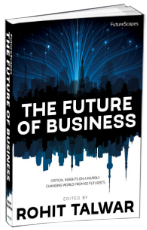02 May Millennials in Spain
Last week I spoke at a conference in Madrid called “No Money”. It was hosted by Spain’s leading newspaper El Pais and was literally about the transition to a cashless society. Foregoing cash in the near future is no far-fetched idea since entire countries are starting to consider getting rid of it. A senior vice president and head of Business Development Customer Solutions at Danske Bank Claus Bunkenborg was one of the panelists talking about Denmark joining Sweden in becoming a truly cashless jurisdiction. Considering it costs 4.9 cents per note to make one $1 bill, and the fact that paper or coin can be lost or stolen and is generally inconvenient, millennials and post-millennials might not see much use of the mint anymore.
‘Mileurista’ – The Generation Making Less Than € 1000 a month
Spain is in many ways an amplification of – and possibly a solution to – many of the economic challenges Millennials are facing in the United States and many other countries. Spain was affected hard by the last recession and has a youth unemployment of almost 50%, in fact the country is struggling with the highest unemployment rate in the developed world. The country has been subjected to stiff austerity measures from the EU, which has made it difficult to initiate local stimulus policies. On the other hand, adhering to the Euro and stringent policies, the country might prevent an inflation that could otherwise run out of control. I don’t think we’ll see a “Spanexit” any time soon, but I am no expert on the matter. Obviously, I was not there to discuss monetary policy. Although the Spanish Millennials, or Mileuristas, are facing a drab reality, I didn’t see the same signs of economic distress as you can see just a few miles outside of the headquarters of some of the world’s most highly valuated companies. While the City of San Francisco is a manifestation of extreme income inequality, with a large population of homeless people and real estate prices affordable only to executives and scientists working for The Four Horsemen, Madrid’s city center is vibrating with well-groomed healthy looking, yet underemployed youngsters. You don’t see the constant humiliation of people who have fallen down on their luck. Indignados, a protest movement of young people that grew up after the recession has developed into an effective movement against foreclosures and evictions. Spain also offers universal health care and since they don’t have a billionaire over class, racking up domestic prices and gentrifying urban areas, it seems like it is still possible to live a decent lifestyle. I was actually surprised how inexpensive many basic items were.
Podemos and the Rise of the Populist Left
There is also an interesting parallel with the rise of the Podemos, a populist left-wing political party spearheaded by charismatic Pablo Iglesias, and the popularity of Democratic presidential candidate Bernie Sanders. Podemos’ rise to power in 2014 was a result of the malaise rising in the wake of the European Debt Crisis. Sanders on the other hand, a long time independent senator before running as a Democratic candidate, represents just as much anti-establishment novelty. Both have gained tremendous support, particularly among Millennials and the youngest generation. The recent Panama Papers revelations are likely to strengthen the sense that traditional institutions and channels are “corrupted” or untrustworthy. Leaks of this type contribute to an ongoing disruptive legitimacy crisis, which many traditional institutions and figureheads are currently experiencing. With the help of new technologies, political and social disruptions could completely circumvent the monetary system and how value is generated and distributed. Millennials and the New Economy In fact, in the New Economy we might redefine how value is created, what it means to have “a job” and what symbols or artifacts we will use to exchange products and services with each other. Please read Millennial Finance and the Cashless Future and The Distributed Automated Network Economy on why the post-millennial mind shift might bring momentum to this shift.


Sorry, the comment form is closed at this time.